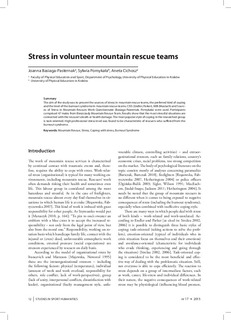| dc.contributor.author | Basiaga-Pasternak, Joanna | |
| dc.contributor.author | Pomykała, Sylwia | |
| dc.contributor.author | Cichosz, Aneta | |
| dc.date.issued | 2015 | |
| dc.identifier.issn | 2300-6412 | pl |
| dc.identifier.uri | http://hdl.handle.net/20.500.12053/161 | |
| dc.description.abstract | The aim of the study was to present the sources of stress in mountain rescue teams, the preferred kind of coping
and the level of the burnout syndrome in mountain rescue teams. CISS (Endler, Parker), MBI (Maslach) and Sources
of Stress in Mountain Rescues Work Questionnaire (Basiaga-Pasternak, Pomykała) were used. Participants
comprised 47 males from Bieszczady Mountain Rescue Team. Results show that the most stressful situations are
connected with the rescuee’s death or health damage. The most popular style of coping in the researched group
is task-oriented. High professional stress level was found to be characteristic of rescuers who suffered from the
burnout syndrome. | pl |
| dc.language.iso | en | pl |
| dc.rights | cc-not | pl |
| dc.source | Studies in Sport Humanities 2015, nr 17, s. 12-17 | pl |
| dc.subject | stres | pl |
| dc.subject | ratownictwo górskie | pl |
| dc.subject | ratownik górski | pl |
| dc.subject | zespół wypalenia | pl |
| dc.subject | mountain rescue | pl |
| dc.subject | stress | pl |
| dc.subject | coping with stress | pl |
| dc.subject | burnout syndrome | pl |
| dc.subject.other | psychologia | pl |
| dc.title | Stress in volunteer mountain rescue teams | pl |
| dc.type | Article | pl |
| dc.date.accessioned | 2018-10-18T07:57:30Z | |
| dc.date.available | 2018-10-18T07:57:30Z | |

